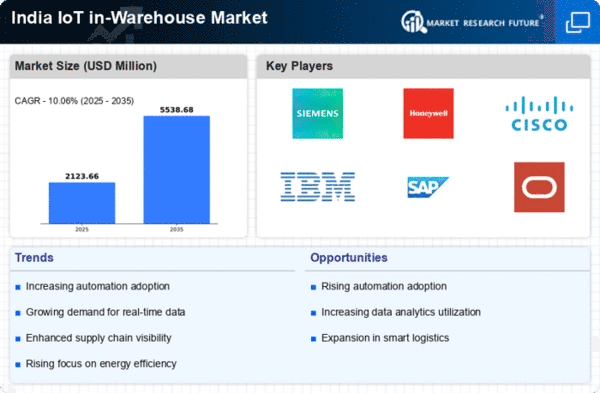Increased Adoption of Smart Technologies
The proliferation of smart technologies, such as sensors and RFID, is transforming warehouse operations in India. The iot in-warehouse market is benefiting from the integration of these technologies, which enable real-time monitoring and data collection. This shift towards smart warehousing is anticipated to enhance operational efficiency and reduce costs. As organizations seek to leverage data for better decision-making, the adoption of IoT solutions is likely to increase. The market is projected to grow at a CAGR of around 20% over the next five years, driven by the demand for smart technologies that facilitate automation and improve overall warehouse performance.
Growing Focus on Inventory Accuracy and Management
Accurate inventory management is crucial for businesses to minimize losses and enhance customer satisfaction. The iot in-warehouse market is witnessing a surge in demand for solutions that provide precise tracking and management of inventory. Companies are increasingly adopting IoT technologies to automate inventory processes, which can lead to a reduction in stock discrepancies by up to 40%. This focus on accuracy not only improves operational efficiency but also enhances decision-making capabilities. As businesses recognize the importance of real-time data in inventory management, the iot in-warehouse market is expected to expand significantly, driven by the need for reliable and efficient inventory solutions.
Rising Demand for Efficient Supply Chain Management
The increasing complexity of supply chains in India drives the need for enhanced efficiency in warehouse operations. The iot in-warehouse market is experiencing growth as businesses seek to optimize inventory management and reduce operational costs. With the rise of e-commerce, companies are under pressure to fulfill orders rapidly, leading to a projected growth rate of approximately 25% in the iot in-warehouse market by 2026. This demand for efficiency compels organizations to adopt IoT solutions that provide real-time visibility into inventory levels and streamline logistics processes. As a result, the integration of IoT technologies is becoming essential for maintaining competitive advantage in the fast-paced retail environment.
Emphasis on Cost Reduction and Operational Efficiency
In a competitive market, businesses are continually seeking ways to reduce costs and improve operational efficiency. The iot in-warehouse market is responding to this need by offering solutions that streamline processes and minimize waste. Companies are increasingly investing in IoT technologies that provide insights into operational performance, enabling them to identify inefficiencies and implement corrective measures. This focus on cost reduction is expected to drive market growth, with estimates suggesting a potential increase in market size by 15% annually. As organizations prioritize efficiency, the adoption of IoT solutions in warehousing is likely to become a strategic imperative.
Government Initiatives Supporting Digital Transformation
The Indian government is actively promoting digital transformation across various sectors, including logistics and warehousing. Initiatives such as the Digital India program aim to enhance the adoption of advanced technologies, thereby fostering growth in the iot in-warehouse market. With investments in infrastructure and technology, the government encourages businesses to implement IoT solutions that improve operational efficiency. This support is reflected in the increasing number of smart warehouses, which are projected to grow by 30% over the next few years. The alignment of government policies with industry needs creates a conducive environment for the expansion of IoT applications in warehousing.

















